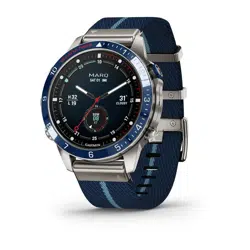Loading ...
Loading ...
Loading ...

Viewing Cycling Ability
Before you can view your cycling ability, you must have a 7-day training history, VO2 max. data recorded in your
user profile (About VO2 Max. Estimates, page57), and power curve data from a paired power meter (Viewing
Your Power Curve, page63).
Cycling ability is a measurement of your performance across three categories: aerobic endurance, aerobic
capacity, and anaerobic capacity. Cycling ability includes your current rider type, such as climber. Information
you enter in your user profile, such as body weight, also helps determine your rider type (Setting Up Your User
Profile, page97).
1 Press UP or DOWN to view the cycling ability glance.
NOTE: You may need to add the glance to your glance loop (Customizing the Glance Loop, page55).
2 Press START to view your current rider type.
3 Press START to view a detailed analysis of your cycling ability (optional).
Recovery Time
You can use your Garmin device with wrist-based heart rate or a compatible chest heart rate monitor to display
how much time remains before you are fully recovered and ready for the next hard workout.
NOTE: The recovery time recommendation uses your VO2 max. estimate and may seem inaccurate at first. The
device requires you to complete a few activities to learn about your performance.
The recovery time appears immediately following an activity. The time counts down until it is optimal for you to
attempt another hard workout. The device updates your recovery time throughout the day based on changes in
sleep, stress, relaxation, and physical activity.
Recovery Heart Rate
If you are training with wrist-based heart rate or a compatible chest heart rate monitor, you can check your
recovery heart rate value after each activity. Recovery heart rate is the difference between your exercising heart
rate and your heart rate two minutes after the exercise has stopped. For example, after a typical training run,
you stop the timer. Your heart rate is 140bpm. After two minutes of no activity or cool down, your heart rate
is 90 bpm. Your recovery heart rate is 50 bpm (140 minus 90). Some studies have linked recovery heart rate to
cardiac health. Higher numbers generally indicate healthier hearts.
TIP: For best results, you should stop moving for two minutes while the device calculates your recovery heart
rate value.
Pausing and Resuming Your Training Status
If you are injured or sick, you can pause your training status. You can continue to record fitness activities,
but your training status, training load focus, recovery feedback, and workout recommendations are temporarily
disabled.
You can resume your training status when you are ready to start training again. For best results, you need at
least one VO2 max. measurement each week (About VO2 Max. Estimates, page57).
1 When you want to pause your training status, select an option:
• From the training status glance, hold MENU, and select Options > Pause Training Status.
• From your Garmin Connect settings, select Performance Stats > Training Status > > Pause Training
Status.
2 Sync your watch with your Garmin Connect account.
3 When you want to resume your training status, select an option:
• From the training status glance, hold MENU, and select Options > Resume Training Status.
• From your Garmin Connect settings, select Performance Stats > Training Status > > Resume Training
Status.
4 Sync your watch with your Garmin Connect account.
Appearance 69
Loading ...
Loading ...
Loading ...
